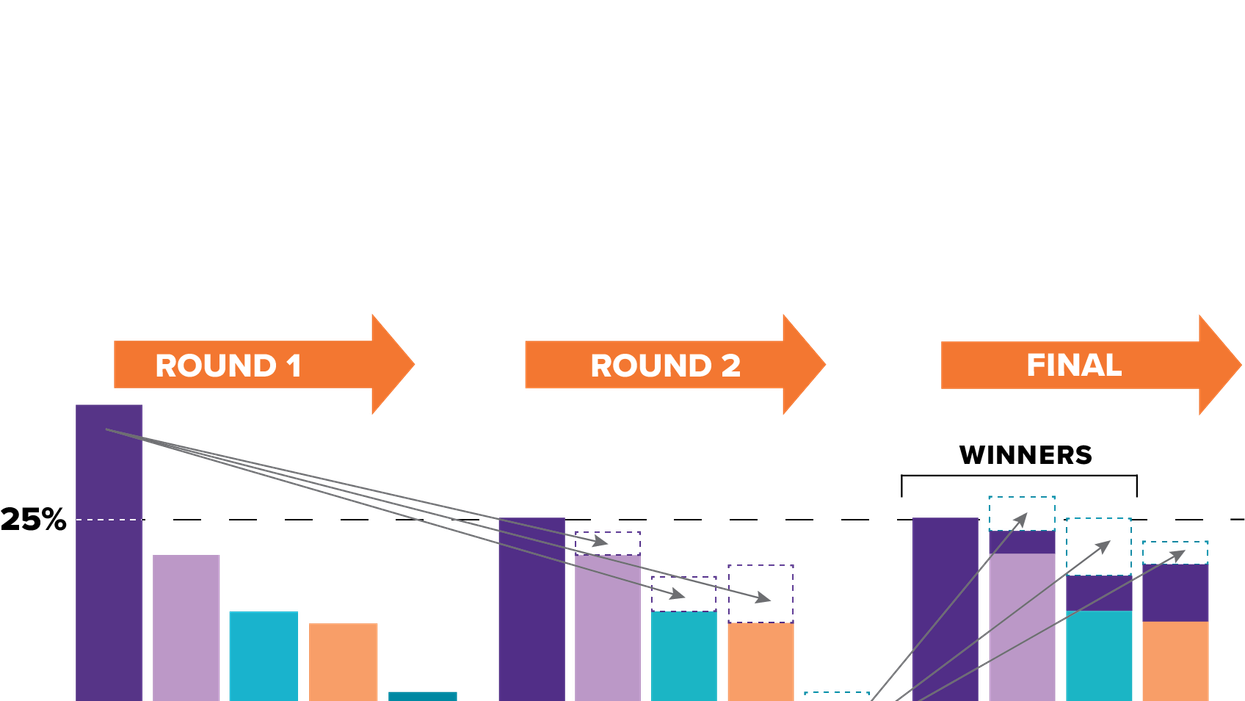Gilda Geist is a rising sophomore at Brandeis University and an intern at RepresentWomen. The non-partisan organization advances women's representation and leadership by advocating for reforms so that more women run, win, serve, and lead.
In response to the recent Supreme Court ruling that upheld partisan gerrymandering, Democratic Rep. Don Beyer of Virginia reintroduced the Fair Representation Act on July 25. This bill would implement ranked choice voting, multi-member House districts and rules for congressional redistricting.
What do all three have in common? They're simpler than they seem and are important for increasing women's representation in American government. Currently, women make up 24 percent of Congress, 29 percent of state legislators, and 0 percent of all U.S. presidents. This is because our current voting system protects incumbents, limits competition and perpetuates the status quo.
One way the Beyer bill would tackle this issue is ranked choice voting. This is an electoral method where instead of choosing only one favorite candidate, voters can rank the candidates in order of preference.
Here's how it works when electing one candidate in the smallest states, like Wyoming and Vermont, which have just one House seat. If a candidate earns more than half of first choices, that candidate wins. If no candidate has more than 50 percent of the vote, the last place candidate's votes are redistributed from those voters' next choice candidate. This process of eliminating last-place candidates and redistributing their votes repeats until one person has a majority of votes and is declared the winner.
Under the Beyer bill however, most states would use ranked choice voting to elect more than one person in each congressional district. When more than one candidate wins, more voters can help elect one of their favorite candidates because the Fair Representation Act is an American, candidate-based form of proportional representation. With three people getting elected to represent one district for example, just over three out of every four voters will elect a favorite candidate because each candidate can win with just over a quarter of the vote. The ranked choice voting tally adds a couple of extra steps to accomplish this goal, but remains just as easy for voters.
What's most important is what ranked choice voting does for fairness. It helps increase women's representation because it is more representative of the electorate. While the current winner-take-all system favors incumbents and reinforces the status quo, ranked choice voting and multi-member districts create opportunities for all underrepresented groups, including women.
At RepresentWomen, our research shows that multi-member districting is another electoral reform that strengthens women's representation in government. The Fair Representation Act would establish that any state with fewer than six seats would simply run a statewide election with ranked choice voting. Larger states would create districts that elect between three and five seats.
Women traditionally have done much better in running and winning in elections with multi-winner districts than single-winner districts. For example, in the Maryland General Assembly, women hold 25 percent of seats in single-winner district, but 45 percent in multi-winner districts — a substantial difference.
Just as with ranked choice voting, multi-member districts increase womens' representation because they change incentives for people to run and expand opportunities to underrepresented groups. Proportional outcomes and a wider variety of candidates provide more choices and greater diversity, thereby giving more women a chance to run and win.
The final component of the Fair Representation Act involves implementing rules for drawing lines for multi-member districts. The bill requires that a state must create an independent redistricting commission if it wants to redraw its district lines. Once the commissions are created, they must be sure to draw districts that comply with the Constitution and the Voting Rights Act. Districts must not be completely safe for any one political party and they must provide minority groups equal opportunity to engage in the electoral process. This will ensure political representation is reflective of the population.
The Fair Representation Act is a non-partisan, common sense piece of legislation. People of all political parties, genders, and races would benefit because this bill would ensure that representation is accurate and fair to all voters.
Nearly 100 years after the 19th Amendment became part of the Constitution, we are still making painfully slow progress toward gender parity in government. The only way to achieve equal representation for women in a timely manner is by making changes to the rules and systems that have reigned unquestioned for years. We cannot wait for the culture surrounding women in politics to change. Instead, we have to be proactive in making politics accessible to women. After we successfully do so, the culture will start to change. Strong legislation that takes a stand like the Fair Representation Act will allow us to move toward this goal of gender parity in government.



















Trump & Hegseth gave Mark Kelly a huge 2028 gift